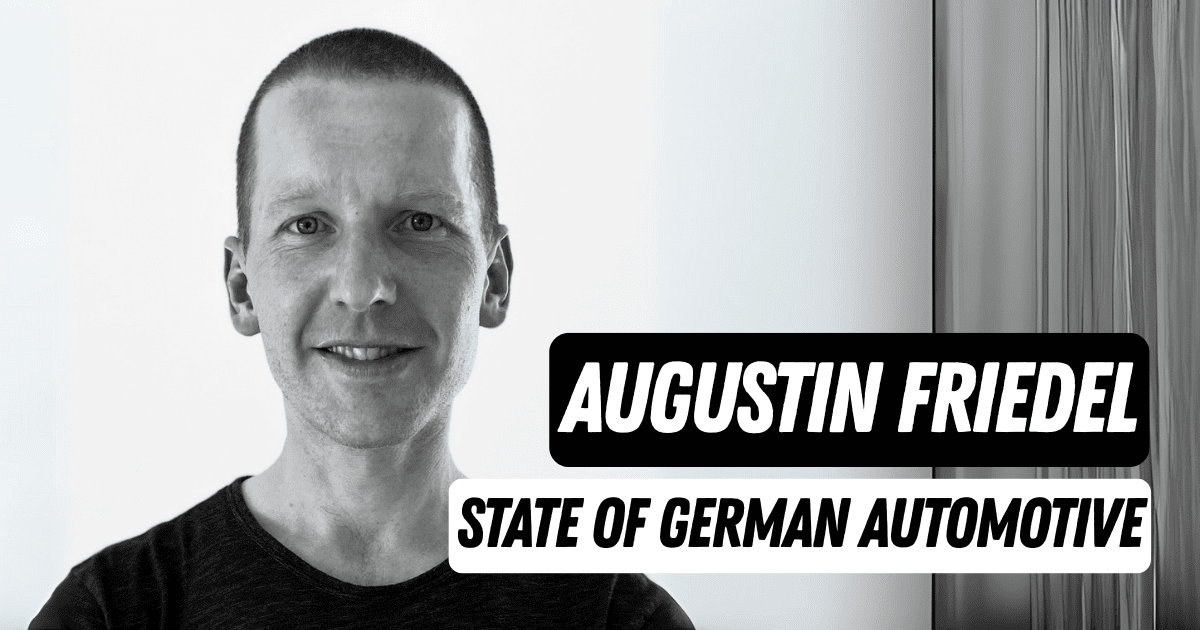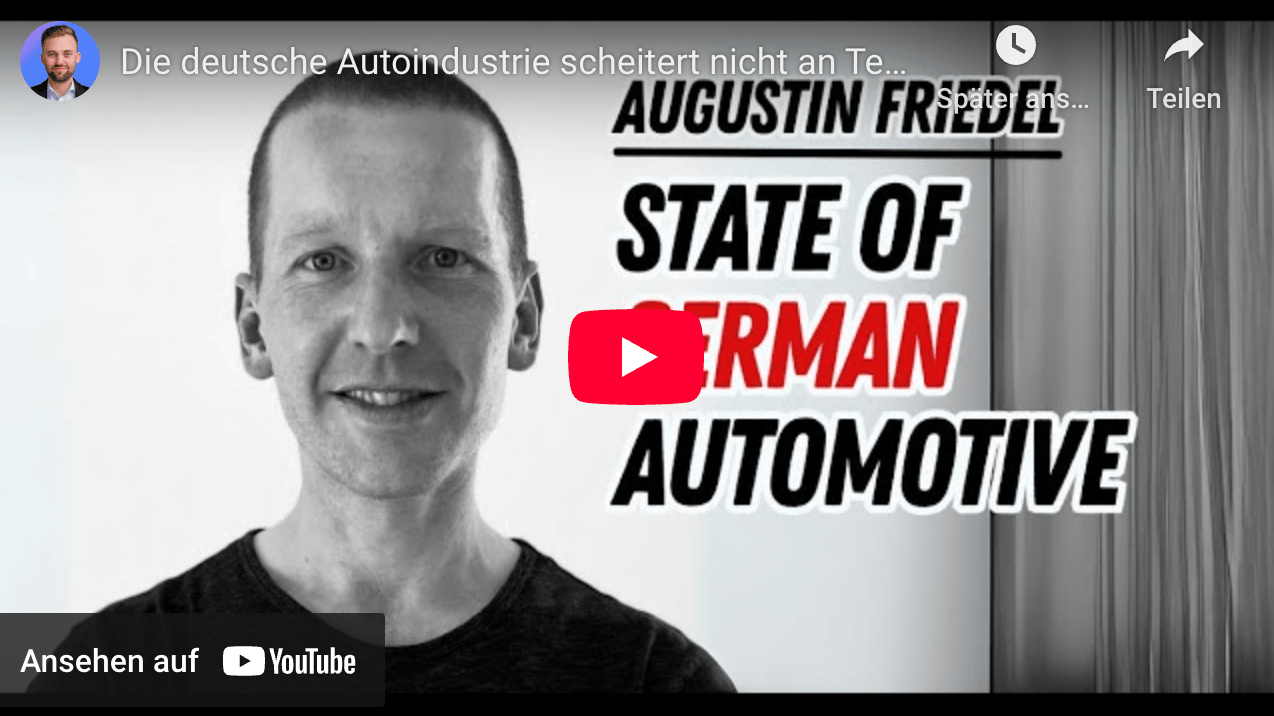- The German Autopreneur
- Posts
- Why German Automakers Know What to Do But Can't Do It
Why German Automakers Know What to Do But Can't Do It
Welcome to Issue #76 of The German Autopreneur!
Today's newsletter comes from my conversation with Augustin Friedel.
You might know Augustin from LinkedIn. He posts about software-defined vehicles, chips, and automotive transformation. With 53,000 followers, he runs one of the largest automotive accounts out there.
But LinkedIn is just his hobby. His real job? He's an Associated Partner at MHP, a company owned by Porsche.
His path into automotive was unusual. He worked at tech startups like Rocket Internet and Uber first. Then he moved to Volkswagen, and later to MHP. This background gives him a unique view of our industry's problems.
Our full conversation lasts 1.5 hours. I've picked out the key points for you. The complete podcast is linked below (in German, but you can turn on English subtitles on YouTube).

10 Key Insights from Our Conversation
1. The biggest problem isn't technical - it's organizational
German automakers know what to do. They just can't do it.
The technology exists. But old processes, silos, and company culture slow everything down.
2. Software-Defined Vehicles are a tool, not the goal
SDVs aren't the end product. They help create "customer-defined vehicles."
The goal? Cars that can be digitally customized for different user groups and regional markets as cost-effectively as possible. The concept of the "global car" is dead. Now it's local-for-local. SDVs make this possible by letting automakers differentiate vehicles for different markets through software.
3. Scaling problems hold back innovation
German carmakers often build impressive individual solutions. But they rarely roll these out fast enough across all their models.
The problem? Different model series act like small kingdoms. Each protects its own territory. They don't want to share innovations or adopt solutions from other divisions. This makes scaling incredibly difficult. Great solutions stay trapped in single model lines instead of spreading company-wide.
4. To compete globally, you need 2 software stacks
One global software platform isn't enough anymore. The future needs two complete software stacks: One for China, one for the rest of the world.
Data laws, different AI systems, and different user needs make this necessary. Chinese data can't leave China. Western systems often work poorly in China.
5. Building parallel organizations isn't giving up - it's smart strategy
Companies like Renault (Ampere) and Ford are building new organizations for future tech. This isn't admitting failure. It's a bold move to accelerate transformation.
Here's why this works: Traditional automakers face a dilemma. Everything is changing at once. Software replaces hardware. Electric replaces combustion. Autonomous replaces manual driving. Their existing structures were perfect for one goal: optimizing costs and volumes for combustion engines. But these same structures now block change.
The parallel approach solves this:
The old organization keeps working as before
It finances the new organization with its profits
The new organization can develop solutions free from old structures and at startup speed
Later, both can merge, taking the best from both worlds
This attracts talent that would never join a traditional automaker. And it eliminates conflicts between existing business and future technologies.
6. Functions-on-Demand need customer focus
The first wave of Functions-on-Demand failed for most automakers. Offering individual car features as monthly subscriptions didn't work.
Why? The approach wasn't customer-focused or data-driven. Successful digital business needs deep understanding of what customers want. You need to know what they'll pay for. You need to study the competition. Internal guesses aren't enough.
7. Making your own chips depends on control
Companies like Tesla and NIO control both hardware and software completely. They control the entire supply chain. For them, making their own chips makes sense.
Traditional automakers have less software control. This usually isn't enough to perfectly match software to individual chips. For them, partnerships with chip makers are often better.
8. China hasn't solved everything either
Contrary to popular belief, Chinese car makers don't have all the answers. They're still experimenting with future tech.
End-to-end AI for autonomous driving? China is still working on this too. They haven't cracked it yet. Strategies keep changing.
This should encourage European companies. The race isn't over.
9. Building European battery production would be "extremely brutal"
Depending on Asian battery makers was a choice. Not a technical necessity.
Fixing this gap now would be extremely expensive. Smart deals, licensing agreements, and joint ventures are better. This way, we can bring production to Europe while building knowledge at the same time.
10. The automotive industry remains an attractive career choice
Despite changes and job cuts, the industry still offers great opportunities. Things are just shifting. New roles and skills are becoming important.
New players are entering. New jobs are emerging, especially in software, AI, and chips. These roles don't just exist at traditional automakers and suppliers anymore. They're also appearing at tech companies as more tech players expand into automotive. This makes the industry attractive for people who might never have been interested before. And it opens completely new opportunities for people already working in automotive. They can now move to tech companies too.
My Take
This conversation confirms what I think about German automotive problems. Change isn't a technical challenge. It's an organizational one. And Augustin shows there are solutions for this.
Augustin understands transformation from all sides. He knows both startups and big corporations. This gives his insights real weight.
What else stuck with me? The automotive industry remains attractive. But the requirements are changing.
Traditional automotive skills will stay important. But they're no longer enough. I could list the new tech skills needed. But we've all heard that a million times.
Let me say it differently: the industry now needs people who think differently.
The typical old-school manager definitely doesn't fit today's reality anymore.
The good news? Change acts like a filter. People who resist change get filtered out. This creates space for a new generation of professionals who will lead the industry into the future.
PS: You can find the full conversation with Augustin in the current podcast episode.

That's all for today.
What did you think of today's email? |
Feel free to reply to this email with your thoughts.
Until next week,
— Philipp
PS: If you find value in this newsletter, please share it with someone who might benefit. Your support helps me continue my independent work for the automotive industry.

